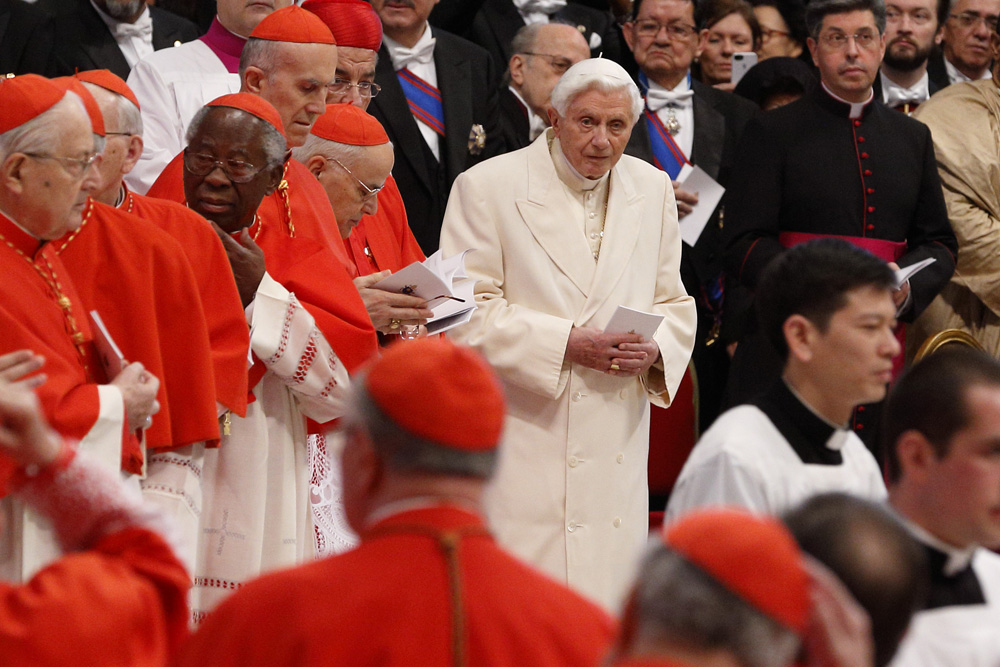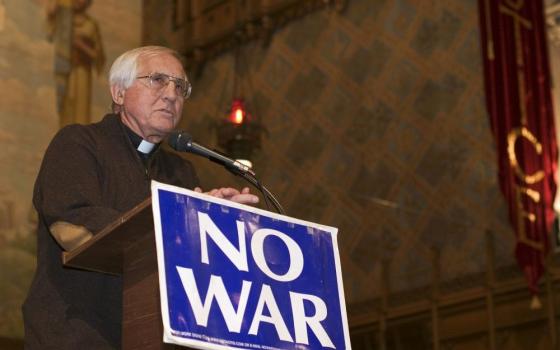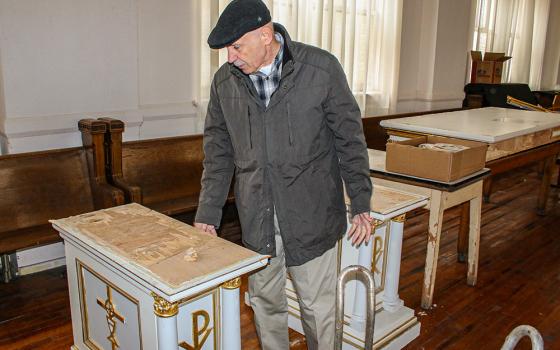
Retired Pope Benedict XVI attends a consistory for the creation of new cardinals in St. Peter's Basilica at the Vatican in this Feb. 22, 2014, file photo. (CNS/Paul Haring)
In her 2014 book, Men Explain Things to Me, essayist Rebecca Solnit attempted to analyze what sometimes goes horribly wrong when men and women engage in conversation. Specifically, when men wrongly assume they know things and wrongly assume that women don't know things.
Well, swap out men in this scenario for Pope Benedict XVI and swap out women for the entire people of God and what you have is the former pope's attempt at papal-splaining in his recent missive "The Church and the scandal of sexual abuse."
Within hours of its appearance on several conservative Catholic websites, the letter was strongly criticized by theologians and Vatican-watchers for its glaring lack of discussion of the structural issues that created the conditions for the cover-up, aiding and abetting of clerical abusers by bishops.
The letter has some truly bizarre moments, as when Benedict claims that "sex films" had to be removed from airplanes because they incited violence, or when he claims that the sexual revolution in 1968 "diagnosed" pedophilia "as allowed and appropriate."
He recounts a story of a young woman who was sexually abused by a priest, who would begin his violating act with the words, "This is my body which will be given up for you." But he seems more concerned with "protect[ing] the gift of the Holy Eucharist from abuse" than he is about the woman or the perverse priestly formation that made it all possible.
In fact, he blames women and gay men for the breakdown of priestly formation. He bemoans the fact that "in various seminaries homosexual cliques were established," though it never dawns on him that his radical exclusion of women from ministry and his radically homophobic theology might have contributed to that phenomenon.
And he claims that communal meals between seminarians and lay pastoral specialists also degraded support for the priestly vocation because the laymen were "sometimes accompanied by their wives and children, and on occasion by their girlfriends." And yet, churchmen like Benedict are always pushing "family values" as the standard by which the laity, especially women, are judged.
But these peculiarities aside, what Benedict's letter achieves is something he likely did not intend: he demonstrates precisely how the institutional church got into its current psychosexual mess.
He does this in two ways. First, by revealing his profound fear of the world and his taboo understanding of sex. Second, by refusing to entertain the notion that the church could ever be wrong on questions of morality, especially sexual morality.
For Benedict, the sex abuse crisis is the result of the libertine sexual revolution of the 1960s, the breakdown of Catholic moral theology around the time of the Second Vatican Council and humanity's abandonment of God.
While some commentators, such as NCR's Michael Sean Winters, have speculated that Benedict's age and declining health may have contributed to his gloomy disposition in this letter, Benedict's suspicions of the world have always been a hallmark of his theology.
Before and during his pontificate, Benedict often spoke of St. Augustine as one of his greatest spiritual companions who had profound influence over his religious imagination. Augustine placed a strong emphasis on the corruption of human nature by sin. He imagined the church as the City of God and the world as the City of Man.
Augustine was also deeply critical and distrustful of sex and sexual desire, arguing late in his theological development that sexual intercourse was so sinful that it could only be redeemed by procreation.
Benedict, you may recall, coined the shudder-worthy phrase "intrinsically disordered" to describe essentially any kind of sex act that isn't missionary-style intercourse between one man and one woman who are bound in matrimony. And, so, for his 32 years in power, first as the prefect of the Congregation for the Doctrine of the Faith (1981-2005) and later as pope (2005-2013), he constantly reinforced a moral theology that treated nearly all sexual acts and sexual desire as shameful and unnatural in the sight of God.
One of Benedict's most prevailing fears throughout his theological career is the loss of the sense of transcendence of faith. He feared that contemporary theology had become too focused on worldly things, like social change.
Like Augustine, Benedict believes that the idea of the church exists in the mind of God, and therefore cannot err and also does not need reform.
This is why in his most recent letter Benedict writes, "The idea of a better Church, created by ourselves, is in fact a proposal of the devil, with which he wants to lead us away from the living God, through a deceitful logic by which we are too easily duped. … But even today there is the Holy Church, which is indestructible."
With this sense of the supremacy of the church and its teachings, there has never been room in Benedict's mind for the grace of self-doubt, that is, the idea that the church's moral theories could prove limited when they are applied to real-life circumstances. There is never a sense in Benedict's thinking, particularly on issues related to sexuality, that the church ought to listen to the experience of others, take seriously alternative reasoning, or rethink its positions.
"Among the freedoms that the Revolution of 1968 sought to fight for was this all-out sexual freedom, one which no longer conceded any norms," he writes.
But the truth is new norms for sexual ethics were being formulated by theologians and ethicists, such as Fr. Charles Curran and Mercy Sr. Margaret Farley, who while deeply grounded in the Catholic theological tradition, also approached the world, nature, human desire and the human spirit as realities to be learned from, not to be feared.
But Benedict himself (then-Joseph Ratzinger) barred Curran from teaching theology at Catholic University of America and investigated Farley's book Just Love: A Framework for Christian Sexual Ethics, which the CDF eventually declared could not "be used as a valid expression of Catholic teaching, either in counseling or formation, or in ecumenical or interreligious dialogue."
When I was in Rome for the sex abuse summit in February listening to bishops for four straight days, one aspect that stunned me was this general sense that if the hierarchy could come up with the best practices and policies and procedures, they could somehow administer the problem away. There was absolutely no sense that the sex abuse crisis had anything to do with the church's limited, taboo-based teaching on sexual morality. There was no sense of a need to re-think the teachings on sex; no need to reckon with the hierarchy's authoritarianism and understanding of its own power as beyond questioning or reproach.
In a strange way, Benedict is right to bring sexuality into the conversation on what caused the sex abuse crisis. What he doesn't see is that the rigid, shame-based sexual morality that he enforced for decades only exacerbated the problem.
Advertisement
What he also does not see is that the abuse crisis came about not because humanity lost sight of God, but because men decided to act like gods. Benedict's notion that seminarians should be separated from laypeople gave these men the sense early in their formation that they were somehow set apart, holy men who were above the law and whose status granted them the power to sexually dominate and violate the bodies of children, women and vulnerable men.
Benedict concludes his letter writing, "I live in a house, in a small community of people who discover such witnesses of the living God again and again in everyday life."
But what he really shows us in this piece is how very small and sheltered his world is, and how profoundly that has limited his theological understanding of the ways in which God is alive is the loves, longings and sufferings of all of the people of God. Too bad he never gave us the chance to explain that to him.
[Jamie Manson is a columnist and the books editor at National Catholic Reporter. Follow her on Twitter @jamielmanson.]
Editor's note: We can send you an email alert every time Jamie Manson's column, Grace on the Margins, is posted to NCRonline.org. Go to this page and follow directions: Email alert sign-up.







